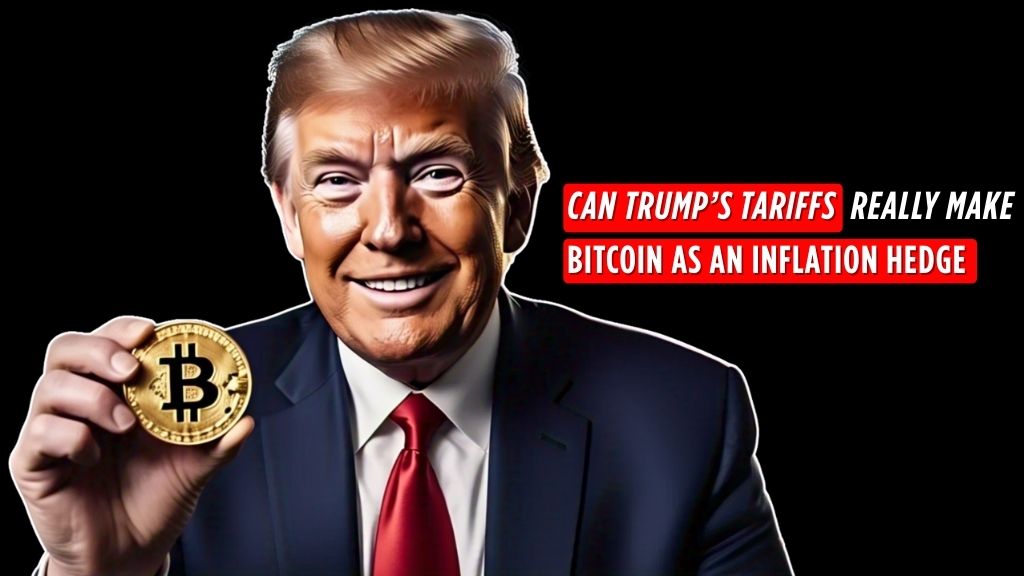
Bitcoin as an inflation hedge has been a hot debate in financial circles. But a surprising twist has entered the chat: Donald Trump’s tariff threats.
Yes, you read that right.
Messari analyst Dylan Bane suggests that Trump’s tariff-driven trade policies may actually pave the way for Bitcoin to finally break away from U.S. equities and emerge as a true long-term store of value—just like gold.
Let’s unpack how this could happen, why it matters, and what you should know before the markets make a sharp pivot.
1. Tariffs Weaken the Dollar — Bitcoin Gains Strength
When tariffs drive up the cost of imported goods, inflation rises. That weakens the dollar’s purchasing power, making dollar-denominated savings less valuable.
In such situations, people often turn to assets that hold value independently of government policy—this is where Bitcoin as an inflation hedge enters the spotlight.
Example: If a TV from China becomes 20% more expensive due to tariffs, and your salary doesn’t go up, your purchasing power goes down. But if you’d stored part of your money in Bitcoin, which isn’t tied to the dollar, you’d potentially retain more value.
2. Bitcoin Could Finally Decouple from U.S. Stocks
Right now, Bitcoin’s price often moves with the stock market. But tariffs could change that by disrupting the economy and making Bitcoin behave less like a tech stock and more like a store of value.
Messari’s analysis suggests that if tariffs escalate, Bitcoin may decouple from equities and act independently—similar to how gold behaves.
This makes Bitcoin as an inflation hedge more viable than ever before.
3. Growing Global Distrust in the U.S. Dollar
BlackRock’s CEO Larry Fink recently warned that the U.S. risks losing its global reserve currency status if it doesn’t rein in debt and inflation.
In that scenario, Bitcoin as an inflation hedge becomes highly attractive—not just in the U.S., but globally.
Real-life implication: Central banks in countries like Argentina and Turkey are already exploring Bitcoin due to rampant inflation and currency devaluation.
4. Bitcoin Is Immune to Central Bank Manipulation
The Federal Reserve can print money. Governments can tweak interest rates. But they can’t change the rules of Bitcoin.
Bitcoin’s capped supply (21 million coins) ensures that inflation can’t be “engineered in.” That makes Bitcoin as an inflation hedge fundamentally more secure than fiat.
Analogy: Imagine owning land in a country where no one can suddenly change the rules of ownership. That’s Bitcoin.
5. Younger Generations Prefer Bitcoin Over Gold
Millennials and Gen Z are far more likely to buy Bitcoin than traditional hedges like gold.
According to surveys, younger investors trust decentralized digital assets more than government-controlled currencies. This demographic trend supports the long-term viability of Bitcoin as an inflation hedge.
6. Institutions Are on Board With the Bitcoin Thesis
What started as a fringe movement has gone mainstream.
From Tesla to MicroStrategy to BlackRock, major players are adding Bitcoin to their balance sheets. Their rationale? Not just growth, but protection—Bitcoin as an inflation hedge.
This institutional confidence legitimizes Bitcoin for everyday investors.
7. Bitcoin Already Reflects Inflation Hedge Behavior
In 2024, Bitcoin surged past $109,000 during heightened economic uncertainty. It’s currently trading at around $84,000, showing strong interest despite volatility.
These trends suggest that the market is already treating Bitcoin as an inflation hedge, especially when inflation concerns dominate headlines.
Is Bitcoin Ready to Be the Next Gold?
Gold has long been the go-to inflation hedge. But Bitcoin offers faster transactions, digital portability, and a fixed supply.
If tariffs and inflation persist, Bitcoin as an inflation hedge could move from theory to mainstream investment strategy—especially for those seeking modern solutions in a chaotic financial system.
FAQs About Bitcoin as an Inflation Hedge
Why is Bitcoin considered an inflation hedge?
Because Bitcoin has a fixed supply of 21 million coins, it is resistant to inflation caused by currency printing or policy manipulation.
How do Trump’s tariffs influence inflation?
Tariffs raise import costs, which often leads to higher consumer prices, contributing to inflation.
Can Bitcoin really replace the U.S. dollar?
While it may not replace the dollar completely, it could become a global store of value or complementary reserve asset.
Isn’t Bitcoin still too volatile to be a reliable hedge?
Volatility remains a concern, but institutional adoption and macroeconomic shifts could stabilize its role over time.
How can an average investor hedge inflation using Bitcoin?
By allocating a small percentage (e.g., 1-5%) of their portfolio to Bitcoin, investors can potentially guard against fiat currency devaluation.

